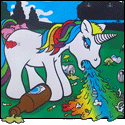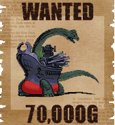|
Stabbey_the_Clown posted:Approach it like every other aspect of world-building. By that I mean, think about how it works and makes sense, and how it affects other aspects of the world. I think I woulad like to keep magic away from being the fix all solution that it appears to end up being in a lot of stories. I think that's my big goal, but I think that's more me being fearful of falling into a trap than anything. I'm sure I've mentioned Mistborn here before, relatively simple magic system that is the building blocks for something more complex later on.
|
|
|
|

|
| # ? May 9, 2024 22:41 |
|
To comment on the magic situation: if the magic is an intrinsic part of the world, consider the ramifications that it has on the behavior of people and cultures which use it or interact with it. If it's otherworldly, Hedge-like, and/or beyond mortal understanding, ask yourself why the magic is a part of the story. If the reason is, "Boy golly do I sure think magic is neat!" then you should probably scrap it or come up with a better story/reason. If the reason has a solid narrative base, then it shouldn't be any different from any other action which establishes character or setting. Just be careful to avoid using it as a deus ex machina. I have a question about combat and fighting in stories. I'm trying to write a novel (topically enough involving magic) and I'm having trouble grokking what the sweet spot is for how much description is too much/too little. I understand this touches on the same issues of scope you have with any high action scene; sweeping across a battlefield is different from a climactic duel between the protagonist/antagonist. I have two parties of six whose clashes are anywhere from individual duels to party versus party brawls. The solution seems to be to establish each character's fighting method in some detail as they come into the story, and then during larger battles to keep their imagery to a minimum while I focus on the characters in the conflict whose perspectives we're following or whose conflict is most important to the scene as a whole. Does that sound correct? As a corollary, what are some good books to read with effective writing about hand-to-hand combat, magical or otherwise? What about pervasive magic systems?
|
|
|
|
Hoodwinker posted:To comment on the magic situation: if the magic is an intrinsic part of the world, consider the ramifications that it has on the behavior of people and cultures which use it or interact with it. If it's otherworldly, Hedge-like, and/or beyond mortal understanding, ask yourself why the magic is a part of the story. If the reason is, "Boy golly do I sure think magic is neat!" then you should probably scrap it or come up with a better story/reason. If the reason has a solid narrative base, then it shouldn't be any different from any other action which establishes character or setting. Just be careful to avoid using it as a deus ex machina. The magic is defintely deeply ingrained in the society of the world and neccessary. Taking it out would cause the plot to simply not work, both in my novel and in the shrot story I am working on. One of my characters can't heal without magic and since she can't use magic herself it's a bit of a weakness for her that any wounds she sustains are semi-permanent. On the subject of fighting I can give a little adivce, I really avoid the large sweeping fights as much as I can and try to focus in on the feelings and thoughts of one person and take everything from their view. Really the type of fighting effects what you're going to be able to say about the fight going on. Like are these people using hands, or swords or is there some guns thrown in there. Since I typically have just guns I don't really have to worry to much about describing the blow by blow because it hardly comes to that.
|
|
|
|
I've given up on writing novels for now. I've written two pieces of trash before (novels) - one a melodramatic borefest, and the other that started out well, but then got so messy and jumbled that I began to have a hard time keeping the story together about 60k words in. These were about 4 and 2 years ago, respectively. I've been working on a third and was about 30k words in after about a month until I found myself a lot closer to the end than I wanted to be, so I kept trying to add subplots and additional elements. I was getting increasingly frustrated with it because I so badly wanted it to be a novel. I eventually stumbled across this lecture by Ray Bradbury. One of his main points is the idea of working up to a novel. I'd be curious to hear others thoughts on this. I think it's a good way of working. I find I enjoy writing shorts better, and I've had a lot more success. He talks about how he wrote a short story once a week for years and submitted all of them. Most of them were trash in the beginning, but there would be a gem every now and again, and most people would be hard pressed to write 52 unpublishable short stories in a row if they're putting in the work in the meantime - studying the craft, reading shorts, reading novels and so on. He also talks about the benefits of reading poetry and lectures/essays. To go back to the story above, I decided to write the ending and scrap the extraneous writing. I still think it has a lot of promise. It just needs to be edited and trimmed a good amount. I felt a lot of relief once I allowed myself to bring it to an end even though I really enjoy the characters and the plot. It's time to focus on shorts again and keep submitting. Feels liberating in a way. I would definitely recommend watching/listening to the lecture. It's an hour long but worth your time, or at least the first 30 mins.
|
|
|
|
Hey, maybe you guys can help me with some plot humps. Suppose you work for an organization which is currently involved in unethical and illegal activities. Previously, you've aided and abetted these activities out of fear and obedience, but recent events have inspired you to finally take a stand. Most recently, you've smuggled a USB filled with information about the illegal activities to an outsider (let's call them the Mole) whom you believe is trustworthy. NOW, the problems are as follows: 1) At a later beat in the story, I need two separate groups of characters to have a reason for seeking one another out, in order to join forces later. Now, that reason will likely have something to do with the aforementioned organization's dirty deeds (among other things), but what, specifically, should that reason be? 2)I want to conceal some of the information about this organization for the time being, in order to save a particular character twist for the sequel. Right now, I'm thinking that the whistleblower gives that Mole an encrypted USB, and hides the encryption key in a separate location. One group of characters could have the USB, and the other group, the key. PROBLEM IS, I'm not sure this even makes sense, from a character motivation standpoint--or, if it does, I haven't come up with a decent rationale for doing this. Why would you give someone data, and then not equip them with the means to access it? If you wanted to ensure that your top-secret info was safe with someone, how would you go about doing that? Bonus question: Suppose you're a third party who's become involved in all this. The Mole--whom you care about deeply--has since become sick with a severe, disabling illness. What would be your reason for choosing to take the Mole to their potentially-sketchy spouse, who has a friendship with your mortal enemy, and NOT to the two people who originally took the fall for assisting the Mole? Is there any logical reason you'd ever make this kind of decision? The details don't matter much, because I'm just interested in whatever ideas pop up.
|
|
|
|
Tartarus Sauce posted:Hey, maybe you guys can help me with some plot humps. I dunno, maybe someone else can help you, but when I read stuff as vague as "Imagine two groups of people, they need a motivation to come together, okay give me ideas", it doesn't really seem like I'm helping you over a small hurdle. How about you come up with some ideas and perhaps bounce them off us?
|
|
|
|
The main problem is the one I've identified---not sure if the motivation (encrypting data, but not including the key to the encryption) makes solid logical sense, or if I'm just having characters act mysterious and vaguely dumb so that I can stall for tension purposes. It may also be technologically cumbersome or silly, as well. Mostly, this is a "logic check." If you read about characters that were acting in this way, would you buy it? Under what circumstances would you buy it? I'm attempting to avoid the common problem of characters inexplicably doing whatever will either build or release tension for the author's convenience, without proper regard for whether a normal, sane human being would ever behave similarly. If that helps at all. And, I keep not being satisfied with my own ideas, which may be a sign that I need to switch tasks, and let things simmer a while.
|
|
|
|
Tartarus Sauce posted:The main problem is the one I've identified---not sure if the motivation (encrypting data, but not including the key to the encryption) makes solid logical sense, or if I'm just having characters act mysterious and vaguely dumb so that I can stall for tension purposes. It may also be technologically cumbersome or silly, as well. Think about it. You go to the trouble of stealing data from a dangerous company, who are presumably going to be lethally pissed off with you if they find out. Why are you doing this? What do you intend to gain? If you want to get the information to law enforcement (or other "good guys") then encrypting it is plain cretinous; it just means that you've got to get 2 sets of information to whoever instead of one. The only way I can think of to make the encryption mcguffin work is if you're blackmailing the original company or selling the data, so you distribute copies of the encrypted files all over the place, then auction the encryption key, arrange for it to be released if you die or disappear, whatever. And that's still stupid, since in these days of fast internet connections you could do exactly that with the original files anyway. Not to mention that once UnethicalCo discover the data's out there they'll go balls-out to cover things up and make sure it's useless to whoever has it. So yeah. Bad idea. (Though on the other hand I've read dumber plots in published novels, so it's not necessarily a dealbreaker if all you want is to get published and plot logic be damned.)
|
|
|
|
Tartarus Sauce posted:Right now, I'm thinking that the whistleblower gives that Mole an encrypted USB, and hides the encryption key in a separate location. One group of characters could have the USB, and the other group, the key. The only way I can think of is if the whistleblower is somehow prevented from giving them the key. Like, whistleblower tells a trusted party how to access the data, in case something happens to him, then as he attempts to hand the data over to the mole he's killed, captured, arrested, whatever. The mole gets away with the USB drive but finds he can't access it and then somehow he and the trusted party need to find out about each other to unlock the data. It'll probably still be full of plot holes though, because that is needlessly convoluted, and it does remove the whistelblower from further action (at least until the plot is pretty much resolved).
|
|
|
|
Tiggum posted:It'll probably still be full of plot holes though, because that is needlessly convoluted, and it does remove the whistelblower from further action (at least until the plot is pretty much resolved). "He put the data in a zip archive and we don't have the password!"
|
|
|
|
For some reason, it could be 90's movies, I can't help but think that a lot of the time it plays out like this: 1) Mole gets our Whistle-blower's evidence, which was damning enough to NEED to be exposed, but unfortunately not a smoking gun. 2) Whistle-blower mysteriously goes missing, with some clue that the smoking gun that verifies guilt lies firmly in the hands of The Company. 3) Then things usually either go "Now the only way is to find x the y that can z my problems away", or our Mole tricks The Company into giving them the evidence or incriminating themselves just in time for the Feds to swarm. So is it gonna be seeking out the only hacker that can crack the encryption key or blackmailing the CEO with bluffed threats about exposing the inaccessible data? Surprise ending: The whistle-blower is successful, but the Feds arrest her/him, this thing goes all the way to the top!
|
|
|
|
Runcible Cat posted:It's technologically doable, but why would anyone do it except as a stupid plot point and artificial tension creator? EXACTLY. That's my thought. Thank you for that validation. Well, and the reason is that this is actually better than where things were headed before. Before, I was noticing that my characters were generally being more reactive than proactive, and were often waiting around to react to something when it affected them directly. So, we had to put the kabosh on that. The Mole character was basically a glorified MacGuffin who just stood around to be acted on by others. The previous iteration of this idea was sans-encryption ballyhoo, but then I had to figure out how to create an incentive for Character Group A (The Mole and Her Lover) to want to interact or join forces with Character Group B (The Quartet of Skilled, Intelligent Regular Folks Who Normally Wouldn't Get Involved With Things Like This). Having Mole take the USB to the Quartet/Group B for help in making sense of the data gets those characters involved, but, realistically, the members of the Quartet/Group B would be smart enough to immediately copy the contents of the USB, at the very least. So, there go the "oops we lost it" or "oops it got confiscated by the cops" dilemmas. The Quartet would probably even tend to take the thing to the cops right away, once they realized it was important. Also, because Character Group A has ties to the whistleblower, and Group B is smart enough to copy the data, what's their incentive for joining forces in the future? Indeed, why does Group B even give a poo poo, since giving a poo poo is dangerous? The risk of not giving a poo poo has to become greater than the risk of giving one. (I'm thinking Group B first gets into trouble when helping the Mole with the USB gets them charged with hacking and industrial espionage, but you'd think turning over the copied data to the cops would theoretically put the blame ball in Evil Corp's court, resulting in a premature "game over.") I also want my characters to continue to have to work for what they have, so I don't want the whistleblower to be a Basil Exposition whose info-dumps and inside connections allow everybody to rest on their laurels. There still need to be mysteries that the characters need to work out on their own, AND the threat needs to be large enough to inspire action, since some of my characters are not the type to get involved with anything that doesn't directly affect them. Certainly, I think one way to hobble my whistleblower is to have what he can say or provide be limited by his position and his security clearance. And, yes, there's a point at which my whistleblower is "killed," but maybe it would be better if he were "killed" earlier? Currently, I have him swoop in at a tense moment, and surprise Group A (Mole and Her Lover) and the reader by rescuing them from Evil Corp's security, instead of turning them in as expected. (The whistleblower previously handed off the USB anonymously, you see, to avoid detection.) Naturally, this opens up into an exposition dump, because now the whistleblower has a chance (and a need) to explain everything he knows. So, again, this raises the question of, Why Don't You Just Tip Off the Police, Morons? Runcible Cat posted:"He put the data in a zip archive and we don't have the password!" Yeah, and I didn't want the idiot plot of the Mole misplacing the key, or the whistleblower being bad with technology. I actually want people to act at the top of their intelligence, more or less. I also have thrown out ideas involving magical viruses and Trojan Horses that conveniently do what the plot demands, whether it's pinging an IP address or corrupting data. Such ideas could potentially work if used sparingly, but they also create potential problems down the line. So, ehh, don't really like that, either. I also realize that I'm kind of teetering on the edge of an idiot plot where people who would normally go to the police, inexplicably don't, because plot. I'd need to make a solid, early case for all of the Feds being corrupt. Part of my issue may be that I'm overly wedded to certain scenes, character interactions, or plot beats along the way, so things may not be flowing organically at this juncture due to that. But, the validation that what I thought sounded stupid, was actually stupid, has been really helpful so far. Thanks, Runcible Cat and company for that. revolther posted:For some reason, it could be 90's movies, I can't help but think that a lot of the time it plays out like this: I'll mull over this. There may be a useful seed in here! Hmmm! Tartarus Sauce fucked around with this message at 15:56 on Nov 8, 2012 |
|
|
|
Tartarus Sauce posted:Naturally, this opens up into an exposition dump, because now the whistleblower has a chance (and a need) to explain everything he knows. So, again, this raises the question of, Why Don't You Just Tip Off the Police, Morons?
|
|
|
|
I Am Hydrogen posted:I eventually stumbled across this lecture by Ray Bradbury. As you can see, about half the authors took the short story path, and the other half jumped straight to novel-length. I think the correct method depends on the individual writer. Some people are just natural short format writers, and it doesn't surprise me at all that Ray Bradbury would be one of them; perhaps you are as well? I'd never written a long piece of original prose, so I also thought starting with short stories would be more manageable, but the thing kept blowing up and expanding and expanding and... I may be more naturally inclined toward longer formats. Still, I think the short story has a lot to offer as a learning tool, and they're dang fun to read. I've been blasting through several anthologies in the last few weeks, and I'm going to continue to work at a few of my own stories. But if you find you're really passionate about this format, don't feel you have to work up to a novel. We tend to look at novels as the highest form of fiction, but why? There's nothing wrong with setting personal goals, and novels sell more in today's market, but unless your plan is to become a full-time professional writer then do what you love.
|
|
|
|
Runcible Cat posted:Or, if they don't know how high the corruption goes, Why Don't You Put All The Data Up On Wikileaks? Ahh, gently caress me. Back to the drawing board.
|
|
|
|
Crisco Kid posted:The most recent episode of Writing Excuses has a short Q&A on the subject of "working up to novels" and provided a link to this survey: http://www.jimchines.com/2010/03/survey-results/ That very well might be. I think I'm a better short story writer. I studied journalism in college and wrote for a paper for awhile, so I enjoy the economy of words. I want to write a novel though, partly because I've always wanted to write one. And if I do it, I want to do it well. I'm not big into the whole blasting out 70k words and calling it a novel thing that NaNo seems to promote. If I do it then I want to put in a good faith effort and make it at least presentable. I think this is part of the reason why I have trouble. I'm extremely critical of my writing. Even when I don't go back and read what I wrote while I'm writing, it's still in the back of my head. I like shorts for this reason. It's easy to play around with it while writing because of the length. I have a new idea for a a novel that won't work as a short. I never outline anything, fiction or otherwise, and I'm going to take the time to develop it before I dive in and start writing this time. I think I might also be well-served to write shorts during the novel even though I've never written more than one piece of fiction at a time.
|
|
|
|
I'm getting hung up on whether I'm allowed to use "yelled" and such if it's really hard to show through the rest of the text whether the subject is yelling. It's getting so bad that my editor is kicking in when I'm writing and halting my process. Should I just type "yelled" or whatever and fix it later, or am I too obsessed with eliminating anything but "said"?
|
|
|
|
|
Black Griffon posted:I'm getting hung up on whether I'm allowed to use "yelled" and such if it's really hard to show through the rest of the text whether the subject is yelling. It's getting so bad that my editor is kicking in when I'm writing and halting my process. Should I just type "yelled" or whatever and fix it later, or am I too obsessed with eliminating anything but "said"? In my view, "said" is the default, basic dialogue attribution and should obviously be the most common. Yelled/shouted/sighed and other innocuous verbs can be used in moderation, if you can't convey it properly through context or the dialogue itself. Any attributions past that first degree of separation ("ejaculated," etc, or using non-speaking verbs like "grinned") might be justifiable in special cases but should never be used habitually.
|
|
|
|
If it's bothering you too much, it might be worth just scrapping the attribution altogether in favor of character name + action beat: John flipped the table. "That's the last puppy I'm eating, Martja!" (Exclamation points are usually gross in narration, but I think using them sparingly is fine in dialogue.)
|
|
|
|
Black Griffon posted:I'm getting hung up on whether I'm allowed to use "yelled" and such if it's really hard to show through the rest of the text whether the subject is yelling. It's getting so bad that my editor is kicking in when I'm writing and halting my process. Should I just type "yelled" or whatever and fix it later, or am I too obsessed with eliminating anything but "said"? Hehe, proscriptivism strikes again. I chuckle because for a while I was trying to eliminate every single instance of "was" in my manuscript, until I realized I was going through awkward contortions not to use it when it was sometimes the best word. Just type "yelled" and don't worry about fixing it (unless you do come up with something better—later). There's nothing wrong with "yelled" or "whispered" in small doses. Hold it in reserve for when it's necessary, and it'll be all the more effective. You can't always tell from context alone, so use them when you need to.
|
|
|
|
I Am Hydrogen posted:That very well might be. I think I'm a better short story writer. I studied journalism in college and wrote for a paper for awhile, so I enjoy the economy of words. I want to write a novel though, partly because I've always wanted to write one. And if I do it, I want to do it well. I'm not big into the whole blasting out 70k words and calling it a novel thing that NaNo seems to promote. If I do it then I want to put in a good faith effort and make it at least presentable. I think this is part of the reason why I have trouble. I'm extremely critical of my writing. Even when I don't go back and read what I wrote while I'm writing, it's still in the back of my head. I'm not a fan of a lot of the stuff Nano promotes, like waiting for some arbitray time to write. I really hate when people try and shoot through a novel and pump up a word count just because it's expected, when I finished my novel my goal in editing was to go back and take out as much as possible while still having it be enjoyable, understandable and fun. I liked that fast paced feeling I got from authors like Dan Wells and books like Fight Club.
|
|
|
Oxxidation posted:In my view, "said" is the default, basic dialogue attribution and should obviously be the most common. Yelled/shouted/sighed and other innocuous verbs can be used in moderation, if you can't convey it properly through context or the dialogue itself. Any attributions past that first degree of separation ("ejaculated," etc, or using non-speaking verbs like "grinned") might be justifiable in special cases but should never be used habitually. Crisco Kid posted:If it's bothering you too much, it might be worth just scrapping the attribution altogether in favor of character name + action beat: Stuporstar posted:Hehe, proscriptivism strikes again. I chuckle because for a while I was trying to eliminate every single instance of "was" in my manuscript, until I realized I was going through awkward contortions not to use it when it was sometimes the best word. Alright, good to hear. Writing is going much smoother now. I've been through the "was" loop myself, and I blame The 10% Solution, and then I forgive it because it's awesome.
|
|
|
|
|
I had a couple of my short stories published by small online magazines last month. Got paid even. ($5 for one, ~$80 for the other.) Would it be inappropriate of me to link to them in case anyone wants to read them? One of them is a cyberpunk-influenced story about the CEO of a company being hunted by assassin priests post-World War 3. The other is a little piece of dark historical fiction about a girl and her unusual lover.
|
|
|
|
Gary the Llama posted:I had a couple of my short stories published by small online magazines last month. Got paid even. ($5 for one, ~$80 for the other.) Would it be inappropriate of me to link to them in case anyone wants to read them? Yeah man go for it.
|
|
|
|
Here they are. Any feedback is appreciated.Gary the Llama posted:The other is a little piece of dark historical fiction about a girl and her unusual lover. A House Divided Gary the Llama posted:One of them is a cyberpunk-influenced story about the CEO of a company being hunted by assassin priests post-World War 3. The Devil's Hat
|
|
|
|
Over the last couple of months I've read The War of Art, The 10% Solution and How Not to Write a Novel. What are some other good reads in this vein?  Preferably available on Kindle or Nook, but not essential. Preferably available on Kindle or Nook, but not essential.
|
|
|
|
Metaphores! They are the hardest thing. Seems like when I'm thinking in the car or engaged in conversation they come naturally. But when I'm writing trying to think of a good original comparison makes my brain seize up like a... cringing... hermit crab? How do you even go about devolving it as a skill? Googling "how to write better metaphores" just results in a lot of "think of two things that are similar and compare them!" 
|
|
|
|
Bear Sleuth posted:Metaphores! They are the hardest thing. Seems like when I'm thinking in the car or engaged in conversation they come naturally. But when I'm writing trying to think of a good original comparison makes my brain seize up like a... cringing... hermit crab? Read your loving butt off. If your butt is not sitting alone in a corner by the end then your reading is insufficient. Metaphor and analogy are just a part of overall imagery development, which is something you can only achieve by exposing yourself to other peoples' work. I'd recommend starting with anything by Michael Chabon, but particularly The Amazing Adventures of Kavalier & Clay or The Yiddish Policemen's Union. Chabon has an absolutely stellar grasp of using imagery to set tone and scene combined with a straightforward style of prose that makes his work easy to absorb.
|
|
|
|
Oxxidation posted:anything by Michael Chabon, but particularly The Amazing Adventures of Kavalier & Clay or The Yiddish Policemen's Union. Chabon has an absolutely stellar grasp of using imagery to set tone and scene combined with a straightforward style of prose that makes his work easy to absorb. Yiddish Policeman's Union is fabulous. Like K+C, I felt it ran on too long in the final act, but drat. That there is some writing. The best thing about Yiddish Policeman's Union is that it's an alt-history, so all the imagery has to work in an invented environment and use its boundaries. I would give my left secondary sexual characteristic to write like that on a good day.
|
|
|
|
Yeah okay. I read all the time though and still struggle. I'm looking for practical advice beyond "you'll learn by osmosis."
|
|
|
|
Bear Sleuth posted:Yeah okay. I read all the time though and still struggle. I'm looking for practical advice beyond "you'll learn by osmosis." Like most of the basic aspects of writing it's difficult to come up with a solid approach for improvement, because the fine details are so dependent on the person trying to write. I doubt you're getting hung up on the simplistic approach to analogies, i.e., "[this thing] was like [this other thing]," and you're instead just having trouble linking together two discrete images in an effective way. But what part of the link is giving you trouble? Is it the visual appearance of the images? Or the smell? The sound? Or the history, or the emotional connotation? The rule of thumb I try to go by is that metaphor should enhance image in two ways - sensationally, and tonally. That is to say, a successful metaphor would help one better understand an image as it applies to the senses, and it would also add to the atmosphere you're trying to set in the scene, whether it be levity, or apprehensiveness, or aggressiveness. It's helped me a lot not just because it keeps my metaphors from clashing with the rest of the prose, but also because it lets me know when a metaphor or comparison is unnecessary or downright redundant. Taking an example from one of the dud contest entries a couple months ago, someone wrote that the walls of an inn were "cracked and broken like the skin of an old woman." That comparison just raises more questions than it answers - what old woman? why a woman? - and doesn't enhance the image at all. We know the wall is cracked and broken, which adds to an atmosphere of decay sufficiently by itself. A lot of people seem to get hung up on analogies because they're treated like a basic and well-used form of imagery (it doesn't help that most Internet writing maliciously abuses them, and that gets picked up through osmosis), but they gain a lot more potency if applied with some deliberation. Oxxidation fucked around with this message at 20:06 on Nov 22, 2012 |
|
|
|
Oxxidation posted:Taking an example from one of the dud contest entries a couple months ago, someone wrote that the walls of an inn were "cracked and broken like the skin of an old woman." That comparison just raises more questions than it answers - what old woman? why a woman? - and doesn't enhance the image at all. We know the wall is cracked and broken, which adds to an atmosphere of decay sufficiently by itself. This is exactly how I heard it described by Bernard McLaverty in a fiction course a few years back. His example went along the lines of: 'the night was as dark as a wolf's throat. Where the hell did the wolf come from?' The problem with presenting a formula for writing metaphors and similes is that once you've written something according to a formula it's pretty definitely a bad metaphor/simile-- It was as cold as some cold thing, as dark as some dark thing (a wolf's throat?), as cracked as a crackly thing (our old lady).
|
|
|
|
A few good rules of thumb: 1. Don't. Seriously. You don't need metaphor and simile in every instance of your writing. Ask yourself why you want it there. Is it necessary? Really? Are you sure? If so, then go on to #2. 2. For grand images, use small comparative imagery. For small images, use grand comparative imagery. For instance: She inched closer to the edge of the world, the unblinking eye of the abyss gaping before her. Or: The air, cold and bitter like the pride of the North Wind, raised the hair on his neck and froze the blood in his veins. 3. Try removing or changing up the words "like" and "as" , just to see if it fits. It 'looks' like less of an obvious comparison this way and helps you get away with a little more and can vary your writing. Of course then you start getting into simile vs. metaphor but whatever. 4. Avoid illogic. Comparative imagery should never distract from the main image you wish to convey. Do not say poo poo like "the boy was small, like a tortilla chip." 5. Understand that it's very rarely certain specific words that make a given metaphor or simile terrible. It's usually because the image did not need really elaboration or more vividness than was already given, or you used the wrong comparison for the wrong image. For example, you wouldn't often say "tortilla chip" would be a good comparative image, but if you said "the boy's bones shattered like tortilla chips", then it adds something visceral and specific to the original image that could only be conveyed by making a comparison. Rule #1 mostly applies though. Most writers honestly don't have the chops to make their reader not cringe a little when it comes time for metaphor. At worst you may lose them or the original image all together. Proceed with caution and make sure what you're doing adds something rather than takes away. Chillmatic fucked around with this message at 21:04 on Nov 22, 2012 |
|
|
|
Metaphor should be the backbone of the story, not the other way round. And the best way to get good vivid similes is to have them come out of metaphor. If your story's the tree, metaphor is the trunk and similes are the leaves. So if you've got a loser character, and you're describing his car, put some detail into the car that comes from your experience (fast food wrappers, dirty, finger writing on the back windows). The car is now a metaphor for his life, so you can talk about his life by talking about the car. And you can get some texture by showing how he reacts to the car. Is he angry about it? Is it his refuge? Does it defeat him? Is there a change you can show in his character by having him take some action with the car? There's good advice for writing similes above, and as they say you should do it sparingly, but I think you'll find it simpler if you're describing something you can see in your head. And just like it's fine to say 'he said, she said', it's fine to just describe things. 'There was a blue cup on the table. It had a white rim with a chip out of the edge.' sebmojo fucked around with this message at 23:02 on Nov 22, 2012 |
|
|
|
Gary the Llama posted:Here they are. Any feedback is appreciated. Read them. You have some serious chops. Of the two the first is my favourite, perhaps because your cool, detached tone fits your narrator best. However the core of the story eluded me a little. Maybe because that dry precision didn't mesh with a confession of a crime of passion? The cyberpunk yarn was also solid. But the darknet/reality crossover confused me, as did the plot. He was trying to escape the net, but loads of homeless people already had, so he needed mushrooms because...? Also the characters felt a little too detached, too cool. I know it's part of the genre convention but based on these two I think you could afford to write with a little more passion. Definitely good stuff though, and congrats on the publication! You should come over to the Thunderdome and throw down, it's p much the best thing when it comes to cranking out prose to weird prompts and talking trash.
|
|
|
|
I Am Hydrogen posted:I've given up on writing novels for now. I've learned (the hard way) to keep things organized, I don't now if it came up already in the thread (I skimmed through all 17 pages to make sure, but you never know.) so I bring it up here: First of, simply keep making notes about characters/background/the story and other stuff, before and while you write. If you think something may have gone wrong or the story gets convoluted, you can simply use Alt+F and your notes to jump around in your manuscript to test the integrity of your writing. For maximum effect, use this method after you finished the first draft: Rewriting becomes less of a headache if you can find the problem zones early on. Another thing that helps stuff along is a good structure, as in prepare your file before you start writing: Have an idea already in your head how many chapters you need, how long they will be, what should happen in them, and so on. And make sure you use a table of contents and captions to create easy points to jump to. Even if you don't need them, after you're finished you can simply erase them, so use that fine bit of word processing to the fullest! Don't give up your trash, by the way: A few new ideas or years later and you can breath life back into it. (Hopefully) quote:I've been working on a third and was about 30k words in after about a month until I found myself a lot closer to the end than I wanted to be, so I kept trying to add subplots and additional elements. You can avoid poo poo like this if you make an story exposé before you start. Plan your plot before you start writing: It really prevents you from running into a literary dead-end if you already now how its supposed to be. Honestly, the idea of someone cramming more and more stuff into something meant to be a lot shorter always makes me wince. Better to end a story naturally instead of just bloating it. Sometimes poo poo just happens. Besides, if you really don't want to let go, you can always stop at a natural end but then add a sequel. If you're good enough, you can make it look seemless, as if the second story is just part of the first one. Another thing, if you write up little ideas about stories and characters as soon as they go through your head, you can assemble a handy little backlog to sift through if your're suddenly running into a writer's block or something. (For this reason, have something to write and a note pad handy wherever you go.) quote:I was getting increasingly frustrated with it because I so badly wanted it to be a novel. I eventually stumbled across this lecture by Ray Bradbury. Well, my method is simple: I collect my little ideas and sometimes I'll write up short exposés to test how far I can stretch a particular idea. If something can be a novel, I mark it as a future novel-in-progress and put it on my backlog for writing/planning novels. If its not enough for a full novel, I'll look if I can make a short story or a novella out of it. If the idea is neat and not good for anything, I turn to mix-and-matching until I've got a story I can work with. In practice it works quite well. Sadly, I'm a lazy bastard and have my largest pet project sitting around while I do stupid stuff like translating an old NaNoWriMo-shitpile of mine into English. So in short, do as I say not as I do. quote:I think it's a good way of working. I find I enjoy writing shorts better, and I've had a lot more success. He talks about how he wrote a short story once a week for years and submitted all of them. Most of them were trash in the beginning, but there would be a gem every now and again, and most people would be hard pressed to write 52 unpublishable short stories in a row if they're putting in the work in the meantime - studying the craft, reading shorts, reading novels and so on. He also talks about the benefits of reading poetry and lectures/essays. You're on the right track. Writing what you enjoy to write will help you keep up the work. And as every skill, you have to train it. Bradbury is right in that if you keep on writing, you will get better sooner or later. (I would say more, but Bradbury already said everything I could put here.) A little anecdote from one of my favorite authors: Simon R. Green supposedly wrote more than a dozen novels before he got lucky and started selling them. You could say he was the Anti-Bradbury in that he did his skill-working with entire novels instead of writing short stories. Libluini fucked around with this message at 01:15 on Nov 23, 2012 |
|
|
|
sebmojo posted:Read them. You have some serious chops. Thanks for the feedback. I'm definitely more pleased with the first story as well. I agree with all of your points about the cyberpunk story. As to your confusion with the story, I'll try to elaborate. He didn't *want* to escape the darknet but had to because he was being hunted through it. His idea was to use the drugs to scramble his brain enough that they couldn't find him (your brain is wired into the net at birth and removing the connection is always a last resort as it may kill you). He thought that a natural drug may be enough to scramble his brain (and thus, their ability to kill him since killings are done via the darknet) without having to undergo a risky surgery. Besides, like I said, nobody really wants to be cut off. They're all addicted to suckling at the tit of technology. (Just like us, har har.) In the end, of course, the priestess ended up taking matters into her own hands as a form of revenge. (It's probably not clear in the story, but Orelli is pretty much responsible for World War 3. This will be explored further in other stories.) I really like the world I created for the story, but I'm not super happy with how the story turned out. I plan to write a few more stories in this universe as I think it's an interesting one. Thanks so much for reading them though. I really appreciate your feedback and plan on really focusing on tightening up my writing and plots.  Edit: Also, I'd love some examples of my detached writing style from either story. I know it's a problem I have but I have such a difficult spotting it in editing. I think some of my other work is better, probably because the plots are much less... Epic? Edit 2x: This little author Q&A should also shine some light into the back story of The Devil's Hat: http://interstellarfiction.com/nonfiction/contributor-qa/qa-with-gary-b-phillips/ Gary the Llama fucked around with this message at 07:07 on Nov 23, 2012 |
|
|
|
Anybody have any good lit reviews to submit to?
|
|
|
|
The broken bones posted:Anybody have any good lit reviews to submit to? You're in luck!
|
|
|
|

|
| # ? May 9, 2024 22:41 |
|
Tartarus Sauce posted:Ahh, gently caress me. Back to the drawing board. There's lots of situations where you'd want to blow the whistle, without necessarily telling EVERYONE in the world all the dirty details. Especially if it goes All The Way To The Top(c).
|
|
|



























